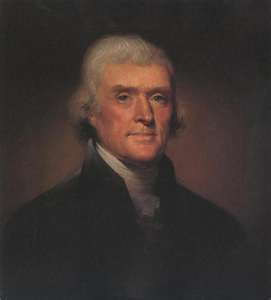Dexter Yarbrough on Thomas Jefferson
Highlighting the contributions of men to the world, by Dexter Yarbrough.
“The man who reads nothing at all is better educated than the man who reads nothing but newspapers.” – Thomas Jefferson
Jefferson
Thomas Jefferson was a great American. He spent his childhood roaming the woods near his Virginia home and studying his books. At the age of 9, he studied Latin, Greek and French. At the age of 14, he studied classical literature and additional languages. Thanks to the wealth of his father, Jefferson had an excellent education.
Thomas Jefferson entered William and Mary College at the age of 16, where he studied science, philosophy, literature, science and mathematics. He excelled as a student and is a great example of using the education available to become a better person. Jefferson also studied law, beginning at the age of 19, and by the age of 31, he was considered one of the nation’s best legal minds.
Philosophy
While he may have been shy in person, Thomas Jefferson used his pen as a mighty weapon. In 1774, he wrote a pamphlet entitled “A Summary View of the Rights of British America.” This pamphlet stated the position for independence and foreshadowed many of the ideas included in the Declaration of Independence, the written document for which he is most famous. Due to Jefferson’s prose style of writing, the Declaration of Independence strongly asserts fundamental human rights (unfortunately, not for black slaves and American Indians) and America’s statement of its philosophy of government.
statement of its philosophy of government.
Jefferson favored states rights over a strong central government and supported the idea that states could nullify federal laws. He wanted a smaller government with very little intervention in daily life. He opposed taxes levied on imports and exports and saw this country as a simple, peaceful land.
Banking
“If the American people ever allow private banks to control the issue of their currency, first by inflation then by deflation, the banks and the corporations will grow up around them, will deprive the people of all property until their children wake up homeless on the continent their fathers conquered. The issuing power should be taken from the banks and restored to the people, to whom it properly belongs.” – Thomas Jefferson
Thomas Jefferson served as secretary of state under President George Washington, but quarrels with Secretary of Treasury Alexander Hamilton over his vision of a centralized national bank caused Jefferson to resign his post in 1793. Hamilton had a pro-federal interpretation of the Constitution, while Jefferson favored a literal interpretation of it. As such, Hamilton, using the ambiguity of the balance of power between the federal and state governments, as worded in the Constitution, consistently took the side of greater federal power at the expense of the states. As Secretary of the Treasury, Hamilton established the country’s first national bank – against the fervent opposition of Thomas Jefferson.
it. As such, Hamilton, using the ambiguity of the balance of power between the federal and state governments, as worded in the Constitution, consistently took the side of greater federal power at the expense of the states. As Secretary of the Treasury, Hamilton established the country’s first national bank – against the fervent opposition of Thomas Jefferson.
“I believe that banking institutions are more dangerous to our liberties than standing armies.” – Thomas Jefferson.
Presidency
At the age of 57, Thomas Jefferson was elected President of the United States. He believed in a “wise and frugal Government, which shall restrain men from injuring one another” but which otherwise left them free to regulate their own affairs. In an effort to minimize the influence of the central government, he reduced the number of government employees, slashed Army enlistments and cut the national debt.
Thomas Jefferson’s brilliant negotiation and ties to France led to the Louisiana Purchase for $15 Million Dollars, doubling the size of the nation. This deal troubled him because he did not want to overstep the central governments powers as outlined in the Constitution (it made no mention of the power to acquire new territory).
Jefferson preferred to live a simple lifestyle during his time in office. He often greeted guests in informal home clothing and often wore a pair of old bedroom slippers.
Contradictions
Although he disliked pomp and circumstance, Jefferson did know how to live well. For example, when he left the presidency, his wine bill exceeded $10,000 ( a handsome sum back then). And of course there is the issue of slavery. As a young politician, he argued for the prohibition of slavery in new American territories, however he didn’t free his own slaves. This is the same man who wrote “We hold these truths to be self-evident, that all men are created equal….” The issue of his long-term sexual relationship with his slave Sally Hemings is also a private side of Thomas Jefferson that conflicted with his public life.
own slaves. This is the same man who wrote “We hold these truths to be self-evident, that all men are created equal….” The issue of his long-term sexual relationship with his slave Sally Hemings is also a private side of Thomas Jefferson that conflicted with his public life.
Conclusion
Thomas Jefferson was a well-educated man who believed in a promising future for his young nation. He espoused beliefs that the central government should be less-intrusive in the lives of the people. His antagonism towards a centralized national bank and the problems it would cause was prophetic.
Jefferson left a legacy in which America continues to celebrate today. While he had some issues in his private life, causing him internal conflict which he never resolved, he nonetheless should be remembered as an important man in world history. – Dexter Yarbrough
http://hubpages.com/profile/Dexter+Yarbrough
http://hubpages.com/hub/Dexter-Yarbrough-on-Hubpages
http://www.dexteryarbrough.net
http://www.dexteryarbrough.com
http://www.dexteryarbroughphotography.com
http://dexteryarbrough1.blog.com/
http://dexteryarbroughlikesphotography.blog.com/
http://www.facebook.com/MR.dexteryarbrough
http://www.thoughts.com/DexterYarbrough/profile
http://www.djyphotography.com/